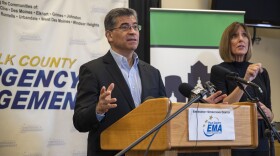Over the last weekend, federal officials authorized the use of the Pfizer and Moderna COVID-19 vaccinations in children ages 6 months to 4 years old.
Iowa health experts are encouraging parents to get their children vaccinated as soon as the pediatric vaccine doses arrive in the state.
"In both vaccines, what we see is young children are able to produce similar levels of what we call neutralizing antibodies with these vaccine schedules, just the same as adolescents and young adults," said Joel Waddell, a pediatric infectious disease specialist at Blank Children's Hospital in Des Moines.
"That's the most important part about preventing hospitalizations — that severe disease — is you really want those high levels of antibodies. And these vaccines do it for this age group."
Both the Food and Drug Administration and the Centers for Disease Control have signed off on authorizing the pediatric doses of the vaccine.
They authorized the Moderna vaccine for kids ages 6 months to 5 years in a two-dose series given four weeks apart, and the Pfizer vaccine for kids ages 6 months to 4 years in a three-dose series given over 14 weeks.
Waddell recommended parents get their children vaccinated as soon as possible because most coronaviruses are fall and winter diseases, and kids need to complete the shot series to have full protection.
"So anywhere from two to three months after you start getting your kids vaccinated is when they'll have protection against hospitalizations," he said. "And so now is the time to act, because we will see more hospitalizations in the fall. That's pretty much a given."
Even though it is unlikely young children will get seriously ill from the virus, COVID is one of the top five causes of death for children ages 1 to 4 years old as of late May, according to the CDC.
Waddell said he hears a lot of concern from parents about fertility issues and long-term effects from COVID vaccines, which have no scientific backing.
"There's no historical reason to think that we would see side effects months or years later. Of every licensed vaccine out there, that's never ever happened," he said.
In rare instances, the vaccine has been linked to cases of myocarditis, or heart inflammation, in kids, particularly boys 16 and older, but Waddell said the number of myocarditis cases linked to vaccinated kids 5 to 11 years old is just two in a million.
According to state health data, a quarter of Iowa's 5 to 11 year olds are fully vaccinated.
He said he's more concerned about children getting severely ill from the virus — or experiencing long-term complications from an infection.
"I've seen myself many children, including children in the toddler age group, who've been hospitalized with heart inflammation from a COVID infection," Waddell said. "And we're still learning what that means for a lifetime."
Waddell said he will be vaccinating his own young children as soon as the pediatric doses arrive in Iowa, which could be the end of this week or next week.
"I cannot wait to get them vaccinated for COVID because I've seen how bad these kids can get sick in the hospital," he said. "I would never recommend something that I would not do personally."
He encourages any parents with questions to reach out to their child's pediatrician.




